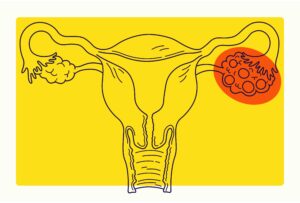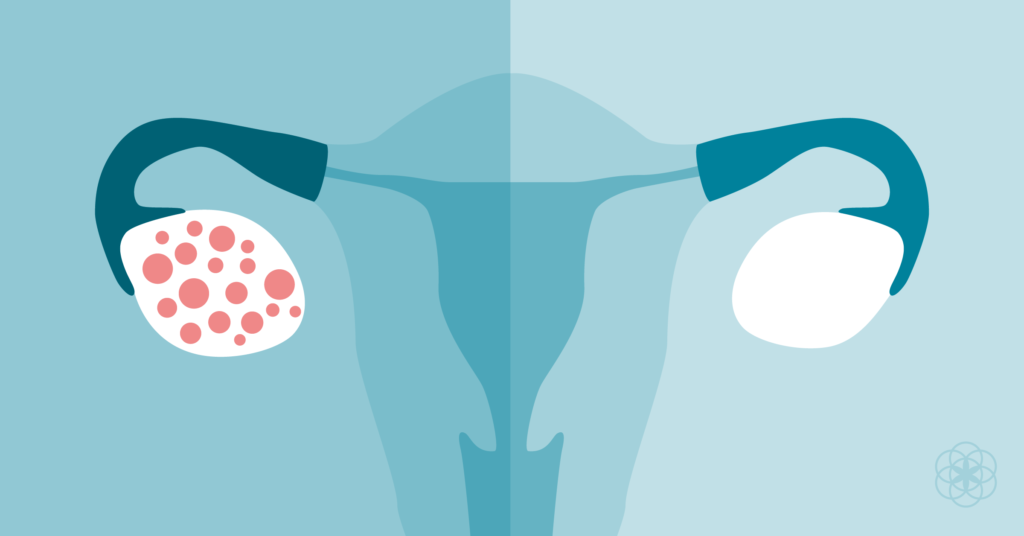Polycystic Ovary Syndrome (PCOS) is a common hormonal disorder that affects people with ovaries, often during their reproductive years. One of the challenging symptoms associated with PCOS is heavy menstrual bleeding, also known as menorrhagia. Managing PCOS-heavy periods requires a comprehensive approach that combines medical interventions, lifestyle changes, and holistic self-care. In this blog, we’ll explore different PCOS Heavy Periods Treatment and the importance of seeking professional guidance.
Contents
Understanding PCOS and Heavy Periods

Polycystic Ovary Syndrome is characterized by an imbalance of reproductive hormones, leading to the development of small cysts on the ovaries. This hormonal imbalance can disrupt the normal menstrual cycle, resulting in irregular periods, skipped cycles, or heavy bleeding. Furthermore, heavy periods associated with PCOS can be distressing and impact a person’s quality of life.
Causes of Heavy Periods in PCOS:
- Hormonal Imbalance: PCOS is often marked by elevated levels of androgens (male hormones) and insulin resistance, which can lead to an overproduction of estrogen. An excess of estrogen without sufficient progesterone can cause the uterine lining to become thick and result in heavy bleeding.
- Anovulation: In PCOS, the ovaries may not release eggs regularly (anovulation). The lack of regular ovulation disrupts the typical hormonal balance in the menstrual cycle, contributing to heavy periods.
- Endometrial Hyperplasia: The prolonged exposure to estrogen without ovulation can lead to the thickening of the uterine lining (endometrial hyperplasia), increasing the likelihood of heavy menstrual bleeding.
Treatment for PCOS Heavy Periods
Effective management of PCOS-related heavy periods involves a combination of medical interventions, lifestyle changes, and targeted therapies. Here are some treatment options for PCOS-heavy periods:
Medical Interventions

Medical interventions play a crucial role in the management of heavy periods associated with Polycystic Ovary Syndrome (PCOS). These interventions aim to regulate hormonal imbalances, control menstrual cycles, and alleviate the symptoms of heavy bleeding. Furthermore, here are some common medical treatments for PCOS-related heavy periods:
- Hormonal Birth Control:
- Combined Oral Contraceptives (COCs): Birth control pills containing both estrogen and progestin are commonly prescribed to regulate menstrual cycles. They work by suppressing ovulation, stabilizing hormonal levels, and reducing the thickness of the uterine lining, thus helping to control heavy bleeding.
- Progestin-Only Contraceptives: Progestin-only pills, hormonal patches, injections, and intrauterine devices (IUDs) release progestin to regulate the menstrual cycle. Progestin helps to stabilize the uterine lining and reduce heavy bleeding.
- Progestin Therapy: Medroxyprogesterone Acetate: Progestin-only medications, such as medroxyprogesterone, are prescribed to induce a regular menstrual cycle and reduce the thickness of the uterine lining. Furthermore, this can help control heavy bleeding in individuals with PCOS.
- Gonadotropin-Releasing Hormone (GnRH) Agonists: Leuprolide: GnRH agonists work by suppressing the production of estrogen and progesterone, inducing a state similar to menopause. While not typically used as a first-line treatment, they may be considered in severe cases or as a short-term solution to manage heavy bleeding.
- Anti-Androgen Medications: Spironolactone: This medication is an anti-androgen that helps reduce the effects of elevated androgens in PCOS. While primarily used for managing symptoms like hirsutism and acne, it may also contribute to the regulation of menstrual cycles and the reduction of heavy bleeding.
- Nonsteroidal Anti-Inflammatory Drugs (NSAIDs): Ibuprofen, Naproxen: NSAIDs are not directly aimed at treating the hormonal imbalances of PCOS, but they can help manage menstrual pain and reduce heavy bleeding by inhibiting prostaglandin production.
It’s important to note that while these medical interventions can effectively manage heavy periods in PCOS, they may not address the root cause of the hormonal imbalance.
Lifestyle Modifications
In addition to medical interventions, lifestyle modifications play a crucial role in managing PCOS-related heavy periods. Lifestyle changes can help address underlying factors contributing to hormonal imbalances and promote overall well-being. Here are some key lifestyle modifications that may be effective in treating PCOS-heavy periods:
- Weight Management:
- Maintain a Healthy Weight: Achieving and maintaining a healthy weight is important for managing PCOS symptoms, including heavy periods. Excess body weight can contribute to insulin resistance and hormonal imbalances.
- Regular Exercise: Engaging in regular physical activity is beneficial for weight management and can improve insulin sensitivity. Exercise also helps regulate menstrual cycles and reduce the severity of heavy bleeding.
- Dietary Changes:
- Balanced Diet: Adopting a balanced and nutritious diet is essential for managing PCOS symptoms. Focus on whole foods, such as fruits, vegetables, lean proteins, and whole grains. Limit the intake of processed foods, refined sugars, and saturated fats.
- Low-Glycemic Diet: Emphasizing foods with a low glycemic index can help stabilize blood sugar levels, reducing insulin resistance. This can positively impact hormonal balance in individuals with PCOS.
- Adequate Hydration: Staying well-hydrated is important for overall health and can support metabolic function.
- Stress Management:
- Mind-Body Practices: Chronic stress can worsen PCOS symptoms, including heavy periods. Practices such as yoga, meditation, deep breathing exercises, and mindfulness can help manage stress levels and promote hormonal balance.
- Adequate Sleep: Prioritize quality sleep, aiming for 7-9 hours per night. Sleep plays a crucial role in hormonal regulation, and inadequate sleep can contribute to imbalances associated with PCOS.
- Supplements:
- Omega-3 Fatty Acids: Omega-3 supplements, such as fish oil, may help reduce inflammation and support overall hormonal health.
- Vitamin D: Many individuals with PCOS have lower levels of vitamin D. Supplementing with vitamin D may be beneficial, but it’s important to consult with a healthcare provider to determine the appropriate dosage.
- Inositol: Inositol, specifically myo-inositol and D-chiro-inositol, has shown promise in improving insulin sensitivity and regulating menstrual cycles in women with PCOS.
- Smoking Cessation and Limiting Alcohol Intake:
- Quit Smoking: Smoking can exacerbate PCOS symptoms and is associated with menstrual irregularities. Quitting smoking can have positive effects on overall health.
- Moderate Alcohol Consumption: Limiting alcohol intake is advisable, as excessive alcohol consumption can disrupt hormonal balance and negatively impact liver function.
Mind-Body Practices

Mind-body practices can be valuable treatment options for managing PCOS (Polycystic Ovary Syndrome) and its associated symptoms, including heavy periods. These practices focus on the interconnectedness of the mind and body, aiming to reduce stress, improve overall well-being, and positively impact hormonal balance. Here are some mind-body practices that may be beneficial for individuals with PCOS experiencing heavy periods:
- Yoga:
- Stress Reduction: Yoga incorporates physical postures, breath control, and meditation, promoting relaxation and reducing stress. Chronic stress can exacerbate PCOS symptoms, including heavy periods.
- Hormonal Balance: Certain yoga poses, such as restorative poses and inversions, may support hormonal balance by improving blood circulation and reducing stress.
- Meditation:
- Stress Management: Meditation techniques, including mindfulness meditation and guided imagery, can help manage stress and promote a sense of calm. Furthermore, reduced stress levels may contribute to better hormonal regulation.
- Improved Sleep: Regular meditation practice has been associated with improved sleep quality, which is important for overall health and hormonal balance.
- Deep Breathing Exercises:
- Relaxation Response: Deep breathing exercises, such as diaphragmatic breathing or paced respiration, activate the relaxation response, counteracting the effects of chronic stress.
- Cortisol Regulation: Controlled breathing can help regulate cortisol levels, a hormone that can be elevated in response to stress and may contribute to hormonal imbalances.
- Tai Chi:
- Stress Reduction: Tai Chi, an ancient Chinese martial art, combines slow, flowing movements with deep breathing. It has been shown to reduce stress and improve mood.
- Physical Activity: While gentle, Tai Chi provides a form of physical activity that can support overall health and well-being.
- Guided Imagery:
- Positive Visualization: Guided imagery involves creating positive mental images to promote relaxation and reduce stress. This can positively impact the mind-body connection and support hormonal balance.
- Coping with Symptoms: Imagining the body functioning in a healthy and balanced way may help individuals cope with symptoms associated with PCOS, including heavy periods.
Surgical Options
Surgical options are typically considered for the management of PCOS (Polycystic Ovary Syndrome) and its associated symptoms, including heavy periods, when other conservative treatments have not been effective or in specific cases where more invasive intervention is deemed necessary. It’s important to note that surgical interventions are usually considered as a last resort and are irreversible. Here are some surgical options for managing PCOS:
- Ovarian Drilling:
- Procedure: Ovarian drilling is a minimally invasive surgical procedure performed using laparoscopy. Furthermore, small incisions are made in the abdomen, and a thin tube with a camera (laparoscope) is inserted. The surgeon uses heat or laser to puncture the ovarian surface, which can reduce the production of androgens and induce ovulation.
- Indications: This procedure may be considered for women with PCOS who are not responding to medical treatments and are trying to conceive.
- Success Rates: Ovarian drilling can be effective in restoring ovulation, but its effects may be temporary.
- Laparoscopic Ovarian Cystectomy:
- Procedure: In cases where large ovarian cysts are present, a laparoscopic cystectomy may be performed. This involves the removal of cysts from the ovaries while preserving healthy ovarian tissue.
- Indications: Large cysts that are causing pain or other complications may be removed surgically.
- Fertility Considerations: Preserving healthy ovarian tissue is important for maintaining fertility, and this procedure is often chosen when fertility preservation is a priority.
Which Method To Choose for PCOS Heavy Periods Treatment?

It’s essential to work closely with healthcare professionals to develop a comprehensive treatment plan. Here are factors to consider when deciding on a treatment method:
- The severity of Symptoms: Consider the severity of heavy periods and associated symptoms. If symptoms are mild, lifestyle modifications and non-invasive interventions may be initially recommended. For more severe symptoms, a combination of medical, lifestyle, and possibly surgical interventions might be considered.
- Reproductive Goals: If fertility is a priority, treatment options that preserve or enhance fertility may be preferred. For individuals trying to conceive, ovulation-inducing medications, lifestyle modifications, and fertility treatments may be considered.
- Medical History: Take into account the individual’s medical history, including any pre-existing conditions or contraindications to certain medications or procedures. Furthermore, this information can guide the selection of appropriate treatments.
- Lifestyle Factors: Lifestyle modifications, including weight management, regular exercise, and a balanced diet, are fundamental components of PCOS management. Consider the individual’s ability and willingness to make lifestyle changes.
- Response to Previous Treatments: If the individual has previously tried certain treatments and experienced limited success or undesirable side effects, this information should be taken into account when deciding on the next steps.
Conclusion
Managing heavy periods in PCOS is a multi-faceted journey that involves a combination of medical, lifestyle, and holistic approaches. It’s crucial for individuals experiencing PCOS-related symptoms to consult with healthcare professionals for personalized guidance.
By addressing the root causes and adopting a comprehensive treatment plan, individuals with PCOS can better manage heavy periods and improve their overall quality of life.
If you are facing PCOS-related issues, PCOS treatment at HerMantra can help. Book your free trial online Pcos treatment session now.


